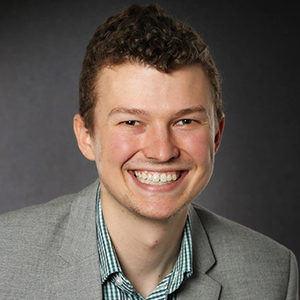The Certified Association Executive (CAE) credential is the most recognizable credential in associations. According to the American Society of Association Executives (ASAE), the CAE credential “is the marker of a committed association professional who has demonstrated the wide range of knowledge essential to manage an association in today’s challenging environment.” In this blog post you will hear from six RGI team members in an interview-style layout who have their CAE credential, why they pursued it and how it has benefited their careers.
Why did you pursue your CAE?
Amanda Bureau, CAE, CVA: At the time, I had only worked for one association. I wanted to expand my understanding of the profession and learn about association management more broadly.
Grant Carpenter, CAE: It was something I knew would benefit my career, and specifically my client, the Indiana Society for Association Executives (ISAE). As an association for association professionals, the CAE designation shows a dedication to the industry and profession. I believe it also showed a willingness to learn more about the role of an Executive Director.
Melissa Heeke, CAE, MLD: A few years into my first job, I realized I wanted a career in association management. Pursing my CAE was a great way to learn more about the profession while building my own credibility and confidence.
Wendy King, CAE: Although I had worked in the association field for nearly 20 years, I knew very little about the CAE designation until I started working for RGI and joined ASAE. Once I understood the significance of the CAE designation, I knew that it was something I wanted and needed to achieve.
Emilie Perkins, CAE, CMP, CMM, PMP, CED: When I began the process of obtaining my CAE, I had been working for 10 years at a Trade Association as a Director of Education. Although I was well respected for my meeting planning skills and volunteer management, I was not confident when it came to other aspects of association management. I wanted a seat at the table, so I needed to understand the full picture of association operations. It was the natural next step in my association professional journey.
Ashley Shank, CAE: I pursued my CAE to further my knowledge of associations. I wanted to better understand how the organization functions from an Executive’s perspective.
Why is a CAE designation important in association management?
Grant Carpenter, CAE: Studying for and obtaining the CAE allowed me to learn the ideal scenario for how an Executive Director should lead an organization. This is important because although ideal scenarios are unrealistic, I learned a baseline on what to consider when making a decision.
Melissa Heeke, CAE, MLD: The CAE is an outward demonstration of an individual’s commitment to association management. More tangibly, earning the designation clearly identifies that a professional carries a well-rounded range of association knowledge.
Wendy King, CAE: By nature, the process of studying for the CAE helps you to become a better association professional. Although you may think you know association management, you learn so much more by going through the studying process. Obtaining your CAE means that you have met rigorous educational requirements. It is a mark of professionalism and a commitment to high ethical standards. It helps you to gain and maintain the trust of your members, volunteer leadership, peers and other stakeholders.
Emilie Perkins, CAE, CMP, CMM, PMP, CED: The CAE is the baseline for association management education, serving as a barometer of your skills and knowledge of association best practices. When I went to college there was no major, minor or even course specific to association management, so aside from real world experience there are not many standardized options for association knowledge advancement which is why the CAE is so critical.
Ashley Shank, CAE: It shows our clients that we have a dedication to the work we are doing and we prioritize educating ourselves to better serve them.
How has your CAE benefitted your career?
Amanda Bureau, CAE, CVA: Having a CAE has opened doors for me, both in terms of job opportunities and volunteer involvement.
Grant Carpenter, CAE: Obtaining the CAE allowed me to get promoted to Executive Director, which is a huge benefit. However, more than that, the knowledge acquired while studying for the exam widened my view on all areas of association management, which will help me in this new role.
Melissa Heeke, CAE, MLD: My CAE has helped open doors for me professionally allowing me to participate in staff and board conversation on a more strategic level. In professional settings among peers, the designation is a marker of our shared experience and expertise within the association community.
Wendy King, CAE: The CAE designation is widely recognized and respected in the association management field. By receiving this designation, it signifies that I am committed to excellence and professionalism in my role. Additionally, it validates my years of expertise and dedication to the profession.
Emilie Perkins, CAE, CMP, CMM, PMP, CED: Although the majority of my time is still spent as a Meeting Professional, the CAE broke down the silos of association management for me. Being able to look at my associations holistically, not just from a meetings prospective, helped me to contribute to the overall success of my associations. And for those of you who are not Executive Directors, it gives you some street cred – the seat at the table that I was looking for almost 10 years ago. It also gave me the confidences to tackle my first Executive Director role 3 years ago.
Ashley Shank, CAE: Being a newer CAE, I’m still exploring all the ways it will benefit my career. However it has demonstrated that I am committed to the industry and capable of taking on more responsibility, which has opened the door to new opportunities for me.
How did you study for your CAE exam? Independently? Study Group?
Amanda Bureau, CAE, CVA: Both! I participated in ISAE’s study group. Then paired with two people I met through that group to continue studying. But there is a lot of reading and study that must be done independently as well.
Grant Carpenter, CAE: I’m really fortunate that I was able to sit in on ISAE’s study groups as the staff liaison. I absorbed a ton of information just by attending, and by the time I really put an effort into studying, I had some of the fundamentals already memorized.
Melissa Heeke, CAE, MLD: I did a lot of independent reading and then joined the Indiana Society of Association Executives to benefit from their CAE study group.
Wendy King, CAE: I joined an ISAE study group that met weekly. This shared learning process helped me to more easily understand and retain information from the study manuals. It was also beneficial to talk with others in the study group about various questions and scenarios that may seem challenging.
Emilie Perkins, CAE, CMP, CMM, PMP, CED: I cannot recommend a study group enough. Since I identified knowledge gaps in my pursuit of the CAE, participating in the study group – not once, but twice! – helped be feel more confident on test day. In addition to the study sessions, I had an accountability partner who challenged me to stay focused and committed to studying. Even now, after serving as an Executive Director for the last 3.5 years, if I were to do it again I would attend the study group. Just because your own association has certain best practices, that does not make them the most correct answer.
Ashley Shank, CAE: I did two sessions of ISAE’s study group over two years, as well as studying independently outside of the study group. I can’t say enough good things about ISAE’s study group and facilitators, absolutely essential to my exam prep. I would highly encourage anyone even THINKING of pursuing the CAE to go to a study group to at least understand what is entailed before committing to going all in.
Anything else you would like to share about earning your CAE?
Grant Carpenter, CAE: I’m really fortunate that I was able to sit in on ISAE’s study groups as the staff liaison. I absorbed a ton of information just by attending, and by the time I really put an effort into studying, I had some of the fundamentals already memorized.
Melissa Heeke, CAE, MLD: When I began studying for my CAE, many years had already passed since I had last studied for an exam. I credit my re-engaged study habits for my decision to go back to school for a master’s degree.
Emilie Perkins, CAE, CMP, CMM, PMP, CED: I am a lifelong learner and have spent the last 15 years achieving different certifications, 5 to date, but I like to remind anyone who is beginning their own journey to do it for the right reason. Certifications/credentials do not automatically make you an expert or give you a massive pay raise, but they do enhance your skills and knowledge which will hopefully lead to improved performance and satisfaction.
Ashley Shank, CAE: If you are not an Executive Director, don’t let that deter you from pursuing the CAE. At first I thought it might not be relevant to me as I wasn’t an Executive Director and was a Sr. Membership Coordinator when I took the exam. However, learning more about all the aspects Executives have to consider gave me an entirely new understanding of the bigger picture and how as an individual I could contribute and make an impact to the team.
RGI has a total of 14 CAE holders. As mentioned above, it demonstrates excellence in the association industry and represents career growth. Whether our staff members have held their CAE credential for years or recently earned it, they have all seen great value in it. For more information on the CAE credential, visit https://www.asaecenter.org/programs/cae-certification.

Craig Banister
Craig joined the RGI team in 2015 as an intern and joined as a staff member in 2018. During his time at RGI, he has worked with associations in the commercial real estate, corporate housing, healthcare engineering, nutrition education and legal industries. He holds a social media marketing certification through HubSpot Academy as well as two marketing certificates through the Association Academy. Craig was selected as an ASAE NextGen Scholar in 2022.

